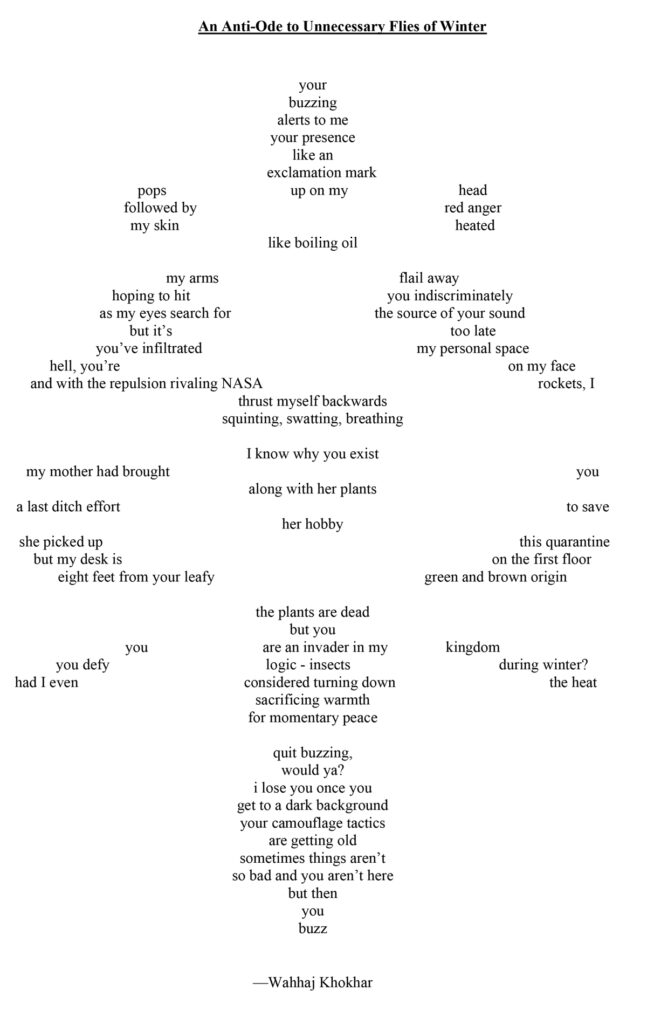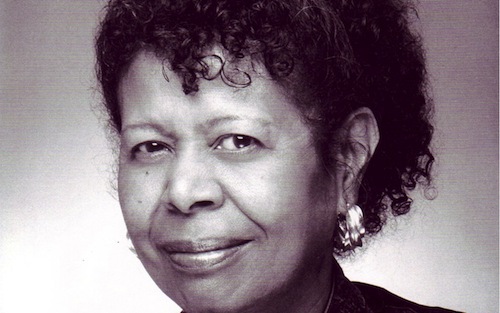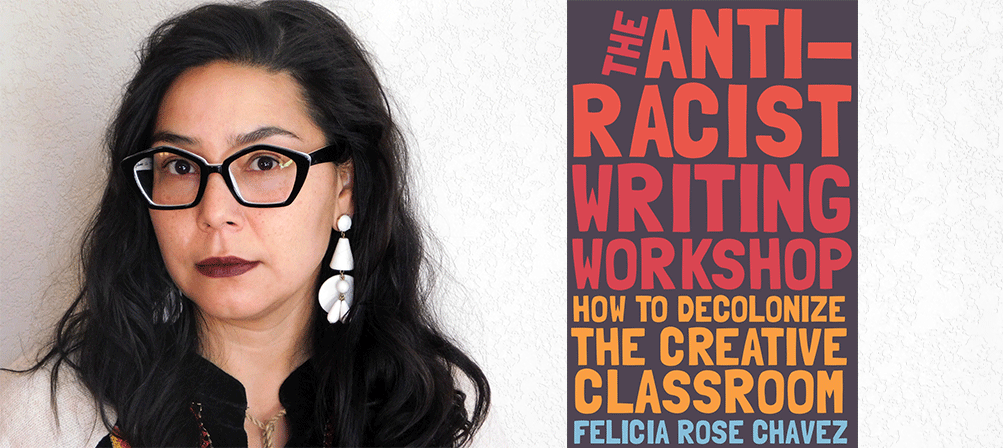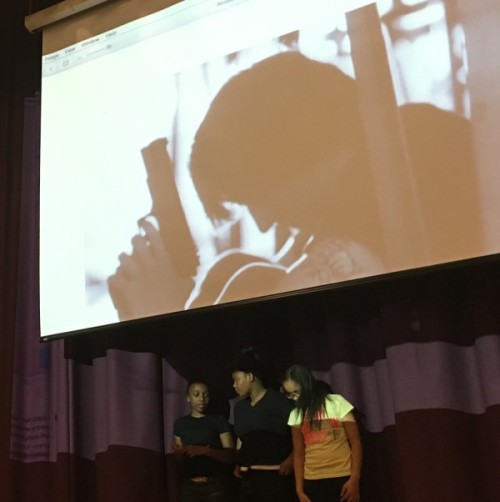Jayne Cortez, jazz poet and central figure of the Black Arts moment, never suffered fools gladly—even if those fools happened to be birds.
In one of my favorite poems of hers, “These New York City Pigeons,” she joyfully and subversively complains about our city’s most prevalent feathered friend, comparing the Big Apple’s birds to the more pleasant doves she encounters in her travels around the world. As in many of her poems, she juxtaposes the abject (poo, profanity, cockroaches) with the peaceful and ironically sophisticated (Duchamp’s pool, croissants, Hiroshima’s Peace Memorial Park). Each line sings with a dense sonic playfulness that is uniquely her own.
As in many of her poems, she juxtaposes the abject (poo, profanity, cockroaches) with the peaceful and ironically sophisticated (Duchamp’s pool, croissants, Hiroshima’s Peace Memorial Park).
This spring, I decided to take advantage of the virtual/synchronous pandemic classroom and allow the students to discuss the poem by writing on the text itself, where they could view and respond to each other’s comments. Before we started commenting, we watched a video of Cortez reading the poem (it’s at the 14:04 mark). On the Google Doc of the poem I’d made, I asked the students to write what they felt made the poem pleasurable. So often when students are introduced to poetry in high school, the teacher asks them to try to decipher the meaning and significance of what they are reading. The problem with this approach is that it makes students think poetry is a code instead of an experience. Because my students—who were mainly science majors and pre-med—were new to poetry, I wanted them to grow to love the genre, not just analyze it. Having students comment directly on the Google Doc allowed them to root their feelings about the poem in the words on the page. A couple of days earlier I had students learn terms to describe sonic patterns and figurative language. We practiced noticing these techniques by highlighting where they were used in a poem by James Wright. For this exercise, though, I wanted students just to notice what they enjoyed and not worry about cataloguing all of the terms they had learned the day before. Here are some of the interesting observations that students wrote on the poem:
On this line:
New York City pigeons moan
strange low mournful quivering cancer-like moans
mixed with
hungry hyena barks
Anshruta wrote:
Mixing the moans produced by the pigeons, who I would normally think of as small and not harmful, with a “savage” creature shows some of her humor.
And on this line:
New York City pigeons are not happy like
pigeons standing on head of the woman
selling bananas on a street corner in Johannesburg
Aayushma wrote:
I liked the unique images because they are so specific and things no one really thinks of.
On:
pearly eyes
inflate their throats
and defecate on the shoulders of pedestrians
Wahhaj wrote:
Honestly, this is just a really funny image that you can easily visualize like a cartoon.
Kristika comments more generally, “The repetitive description of New York Pigeons sort of being ruthless is comedic since it defies the expectations of the reader.”
I was pleased with this method of student commentary because it allows students to engage with the poem in an in-depth way relatively quickly, leaving time for students to write a draft of their own poem during the class period. It also made it easier for the quieter students to participate.
After the students read the poem and responded to it, I asked them to think of things in their own life that get on their nerves. I had them type all of their pet peeves and things that annoy them in the chat box. After being in quarantine for a year, the students had a lot to complain about. I thought they would write five or six things, but we had dozens typed within a minute.
I then asked them to pick one of the objects or animals or concepts listed in the class chat box list (or come up in their own) and write a poem about why that particular thing gets on their nerves. I urged them to use their words to paint a picture (or pictures) of their pet peeve, to think about what the object or animal looks, smells, sounds, feels, or tastes like and to try to show the reader something that not everyone might notice. We had already discussed figurative language, so I suggested they try using metaphors and similes. I also said that they might want to compare it to something similar somewhere else, the way Cortez compares NYC pigeons to pigeons in other places. I mentioned using hyperbole to exaggerate some of the qualities that annoyed them. Part of what makes Cortez’s poem so much fun is how over the top it gets.
I was thrilled with how playful and vivid their poems ended up being.

I love how Wahhaj relates his hatred of the fly to the speaker’s mother’s pandemic hobby; the line gives the poem a context that suggests the larger world and makes me wonder how the poem’s anger relates to the moment we were all living through. I also love how Wahhaj plays with diction, how the poem juxtaposes the high diction of words at the beginning of the poem (“presence,” “indiscriminate,” “camouflage tactics”) with the slang of “would ya” at the moment when the speaker becomes the most desperate. In the first draft, this poem had a lot of endstopped lines. During office hours, I suggested to Wahhaj that he experiment with the lineation and add enjambment, so that the form of the poem would mimic the speaker’s agitation. Wahhaj decided it would be fun to create a calligram.
Like Wahhah, Anshruta’s poem has fun with exaggeration and high diction. Look at how all the V sounds in the second stanza mimic the buzzing of the insect.
Mosquitoes
Bearers of the Zika Virus,
Yellow fever, Chikungunya.
You don’t simply carry viruses;
you are one.Vector-borne illnesses,
vexing humans with your trivial presence
as you transmit war cries.With one bite of my skin, one by one, your comrades join you.
I’ve been trapped by the enemy.High-pitched buzzing,
equivalent to screams of the Devil.Why do you choose your duty to be violence?
Rather than taking in pollen,
you choose to take in blood.Tropical vacations require topical ointments
when you choose to decorate my arms in oddly shaped bumps.
As I scratch the bumps with one hand,
I wildly flail at you with another.Admittedly, I’ve discovered some good during our times of war.
Long, narrow, colorful body with transparent wings,
while dragonflies provoke fear into your small,
fragile body of being snatched and torn apart,
they are my rightful allies.It pleases me when I see you
––Anshruta Chidananda
finally settling yourself on a surface
devoid of skin.
A shadow looms above you,
plastic mesh slowly closing in on your minuscule body.
After a simple whack,
you paint the surface red and black,
and I can finally relax.
Finally, I believe that Laura’s poem captures the ranting rhythm of Cortez. The lines comparing the color of the blue jeans (before and after the wash) to waves and sky creates a beautiful image while simultaneously parodying nature poetry.
Blue Jeans
These blue jeans
Falling down my waist
Yet squeezing my thighs
Shrinking in the dryer
And stretching out from wearThese blue jeans
Are folded neatly
Conspiring on shelves
In shopping malls
Whispering to each other
All the ways
They’ll fool me into buying them.Their fabric deceives
Appearing vibrant like
Waves in the Pacific
But fading into the pale blue of the sky
After one or two washesTheir length
Perfect on the first wear, I think?
But somehow I either
Grow or shrink a foot overnight
These damn jeans would rather
Do anything
Than fit on my body.It’s easy to get past my ankles
But after that
It’s World War III
To pull them up my thighs and waistI bet I can graduate college
Grow old
Get married and have children
Before these menaces
Finally cooperate with meMaybe one day
—Laura Lassen
Some goodness will grow
In their pockets
But for now
I’ll let them laugh
And I’ll choose
Another pair of pants to wear.
I love all of these poems for their music, their passion, their imagination and humor. They remind me that even the most annoying parts of life can be fodder for art. So bring it on!
Joanna Fuhrman is an Assistant Teaching Professor in Creative Writing at Rutgers University and the author of seven books of poetry, including To a New Era (Hanging Loose Press, 2021) and the forthcoming Data Mind (Curbstone/Northwestern University Press, 2024). Fuhrman's poems have appeared in Best American Poetry 2023, The Pushcart Prize anthology, The Academy of American Poets' Poem-a-Day, and The Slowdown podcast. She first published with Hanging Loose Press as a teenager and became a co-editor in 2022.




